Photographs: Reuters M R Venkatesh
India had time to plan and improve its competitiveness and infrastructure. Yet it chose not to. And for that we need to blame our government, says M R Venkatesh.
The downgrade of America's debt in the first week of August 2011 by Standard & Poor's has been described as a tipping point by some in the shift of economic power from the West to Asia, notably China and India.
While the United States has been keen to downplay the entire episode, countries (notably the Chinese) which have lent money to the US, are not amused.
Economists foresee that the US response to the downgrade would be on predictable lines: the US will launch another round of loose monetary policies. Probably christened the next Round of Quantitative Easing (QE-III), the US Fed will continue to pursue easy money policy for the next few years.
Anticipating this, the Chinese state news agency Xinhua warned that unless the US 'reduces its enormous military expenditure and bloated social costs', another downgrade was 'inevitable'.
The reason for the Chinese becoming paranoid about the US debt downgrade is obvious -- it is the world's largest creditor nation (estimated at $1.2 trillion) to the US.
. . .
Economist PM highly economical about economics
Image: Prime Minister Manmohan Singh.Photographs: Reuters
As a net consequence of all this the Chinese have begun allowing their currency to appreciate against the US dollar over the years.
Post downgrade, the Yuan appreciated beyond 6.4 per dollar for the first time in 17 years. It may be noted that China had pursued a weak Yuan policy as a part of its export-led overall economic model.
Economists, including the International Monetary Fund, see this development in positive light. According to them, a stronger Yuan would help stabilise the global economy, as well as aid government efforts to tame inflation and rebalance the nation's growth toward domestic demand and away from exports.
Correspondingly, the Chinese approach paper to their Twelfth Plan seeks to rebalance their domestic economy, ameliorate social inequality (they too have begun talking of inclusive growth!) and protect the environment.
Should India allow a weak Rupee policy?
Irrespective of the downgrade, one is certain that the Chinese are loath to play the globalisation game. As the Chinese withdraw from global markets, increasingly questions of whether we should take the place of China as a manufacturer-exporter will confront us.
. . .
Economist PM highly economical about economics
Photographs: Reuters
Should we too have a weak rupee policy? Should we too compensate our exporters for lack of infrastructure through a weak rupee?
Assuming for a moment that India should indeed have a policy of weak currency, the obvious question to follow is -- what is the extent of devaluation that needs to be planned?
To understand what has been stated above a reference to the Big Mac theory is inevitable. The Big Mac Index is a 'light-hearted' guide published by The Economist to compare the currencies of different countries.
The theory holds that a Big Mac in New York, for instance, is no different from a Big Mac in India. The Big Mac index is based on the theory of purchasing-power parity (PPP).
According to this theory, exchange rates should move towards levels that would equalize the prices of an identical basket of goods and services in any two countries.
. . .
Economist PM highly economical about economics
Photographs: Reuters
Therefore, if the price of Big Mac in the US is say $1, then one expects that price of the Big Mac in India to be Rs 45, approximating to the official exchange rate of the Indian rupee to the US dollar.
If the price of the Big Mac is priced, say, Rs 25 in India, then the rupee is said to be undervalued and this would call for revaluation.
In contrast, if the Big Mac were to be priced at Rs 65, then the rupee would be said to be overvalued and would call for devaluation.
Though a crude method, the Big Mac theory more or less demonstrates the artificial under or over valuation of a country's currency, ostensibly under the influence of its central bank.
Naturally, Big Mac Index gets the attention of central banks, including the Reserve Bank of India.
. . .
Economist PM highly economical about economics
Photographs: Reuters
Shefali Anand in an article in the Wall Street Journal in the first week of August points out, 'In a paper published in April, authors from the Indian central banks' department of Economic and Policy Research, cited the 2010 Big Mac index when discussing how undervalued the Chinese Yuan was undervalued.'
The same article -- titled India ranks low in Big Mac Index -- points out to the index published by The Economist in July 2011 bringing out the fact that 'India has the most undervalued currency among 37 major currencies -- 53 per cent lower than the US dollar.'
In contrast, the Chinese Yuan was undervalued by 44 per cent.
The reason for such undervaluation of the rupee stems from the fact that successive governments believe that a weak rupee is an indirect subsidy for the lack of poor infrastructure in India and resultant erosion in our competitiveness at the global level.
Obviously, it is easier to devalue the rupee than build our infrastructure or improve our competitiveness.
. . .
Economist PM highly economical about economics
Photographs: Reuters
As this index suggests, we have already overcompensated our exporters (and domestic players) heavily for our lack of competitiveness through a weak rupee.
In the process we have also heavily subsidized foreign investment (which is predominantly Indian money routed abroad and reinvested back) into India. That, in a way, explains the fetish of our governments with a weak rupee.
Interestingly, the Chinese rating agency Dagong Global Credit Rating Co had cut the credit rating on August 3 (i.e. even before the S&P downgrade) of the US from A+ to A with a negative outlook after the US federal government announced that the country's debt limit would be increased.
'The decline in the federal government's debt-paying ability is irreversible,' it said, adding that the US Congress has not found a constructive way to increase the country's economic growth.
Even assuming for a moment that we indeed improve our competitiveness, devalue the rupee and succeed in an export-driven model, the global experience has demonstrated that such an economic model is pregnant with huge risks of holding a currency that is on its way down.
. . .
Economist PM highly economical about economics
Photographs: Reuters
Secondly, a strong currency is an antidote to inflation. Given our track record of tackling inflation, it would be suicidal to allow the rupee to depreciate any further.
On the contrary, a stronger rupee could well be the answer as it facilitates higher quantum of imports.
That effectively rules out further devaluation of the rupee, at least in the short run.
Should India revalue its currency?
It is indeed tempting to suggest that India should take China's position in the global manufacturing chain by pursuing a weak rupee policy.
But as explained above, the rupee has been significantly weakened by the intervention of the RBI over the years.
. . .
Economist PM highly economical about economics
Photographs: Reuters
This effectively means we cannot engage in the game of competitive devaluation any further with other Asian countries. Perhaps, we need to turn the idea on its head and look at the consequences of a stronger rupee.
It may be recalled that devaluation was a strategy planned in 1991 along with the reforms process. But subsequent events, both, at the national and global levels have demonstrated that the devaluation strategy and export-led model has run its full course.
Is it the right time for an alternative strategy of a stronger rupee?
For instance, if the US dollar is available at Rs 25, perhaps petrol will be available at Rs 30 and diesel at Rs 25 a litre. The net impact of such macroeconomic adjustments on the prevailing level of inflation within the country can never be overemphasized.
Of course, our earnings will go down in nominal terms, but we can purchase more out of such lower earning.
. . .
Economist PM highly economical about economics
Photographs: Reuters
While the positive consequences of a revaluation are numerous, there is a major hitch here too. Our imports exceed exports by approximately $10 billion every month and annually by about $110 billion.
This trade deficit is made good by foreign capital inflows and more importantly remittances by Non-Resident Indians working abroad.
What must be worrying policy framers is that given the level of our competitiveness any revaluation of the rupee would lead to higher imports, larger trade deficits and dry foreign exchange inflows into India.
It could possibly dynamite the prevailing equilibrium within our economy. That makes the cost of revaluation prohibitively high.
The global economy, as it stands today, offers us two choices -- one to devalue the rupee and play the Chinese game. That would be extremely risky given the fact that the Chinese themselves are a victim of their own success and are completely flummoxed by the turn of events.
. . .
Economist PM highly economical about economics
Photographs: Reuters
The alternative of a stronger rupee and allowing increased domestic consumption too is fraught with adverse consequences.
Should the rupee appreciate -- given the state of our competitiveness -- Indian enterprises would be rendered uncompetitive even in India.
A government headed by an economist was surely expected to anticipate and take advantage of these global developments. Surely, despite the opportunity we have not positioned ourselves either way to take advantage of the prevailing situation.
We neither have the legroom nor the headroom at this point in time.
Let us not forget these developments did not happen overnight. We had time to plan and improve our competitiveness and infrastructure. Yet we deliberately chose not to.
And for that we need to blame our government. Inexplicably, a government headed by an economist prime minister, is highly economical about economics.
The author is a Chennai-based chartered accountant. Comments can be sent to mrv@mrv.net.in

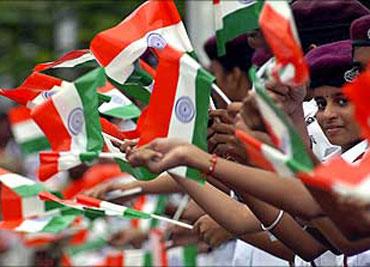
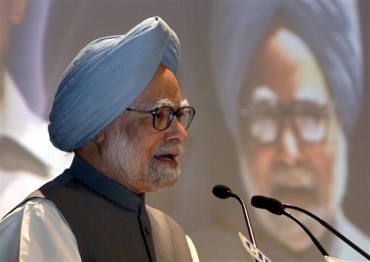

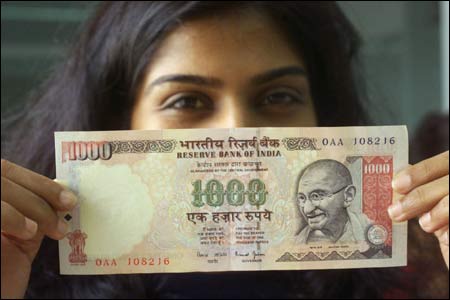
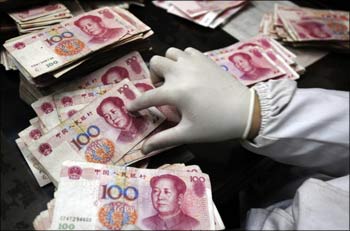
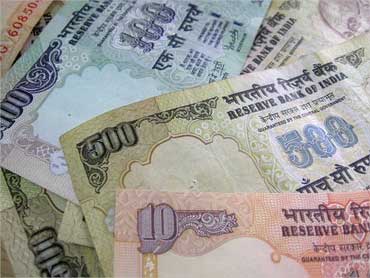

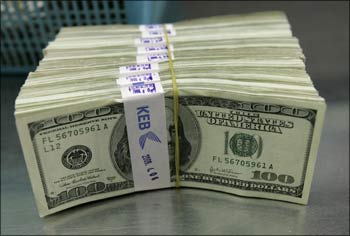
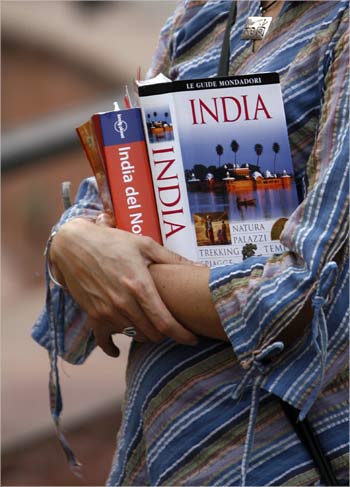
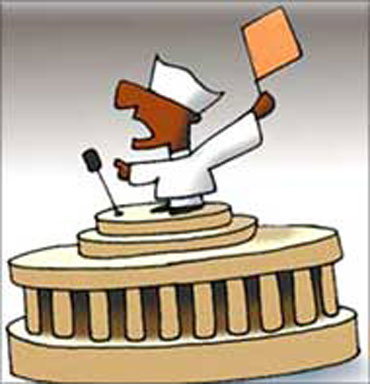
article